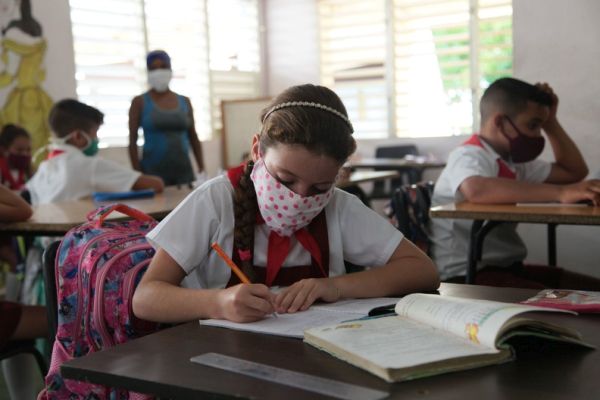
(Photo: Oscar Alfonso Sosa / ACN).
Cuba today guarantees the full enjoyment of human rights to all its citizens through free, inclusive and quality programs, in contrast to the flagrant violation that the blockade imposed by the United States government on the Caribbean nation represents for the people.
The panelists of the radio and television program Round Table on Human Rights, Cuban Rights, agreed that the genocidal economic and financial harassment of the empire has not diminished even in times of pandemic of the COVID-19 and has repercussions on the normal development of fundamental sectors such as health and education.
Rodolfo Reyes Rodriguez, Director General of Multilateral Affairs and International Law of the MINREX, highlighted that many of the universal human rights have been a guideline in the work of the Cuban Revolution and cited the role of doctors and their solidarity work as an example of the promotion of human rights.
The election of Cuba to be part of a world organization linked to this issue, he said, is a recognition of the country’s work and prestige in this field, in which international cooperation is of great importance.
However, examples of violations of rights such as repression and disappearance of journalists and social leaders in many countries, don’t find any resolution of condemnation, which denotes the hegemony that US exercises in the international organization and the imposition of their employers in countries with neoliberal governments.
Panelist Nohemí Doris Causa Palma, head of the national Maternal and Child Health Department, stressed that the blockade has had a negative impact on one of the fundamental rights, namely health.
However, she pointed out that one of Cuba’s achievements in this field is the production of vaccines to protect the infant population against 18 diseases, which has made it possible to save the lives of thousands of children, and to maintain the country’s status as free of HIV transmission from mother to child.
The health and research programs are aimed at offering a better quality of life to the population from birth, always free of charge, among which the cornerstone is the family doctor and nurse, said Causa Palma.
The confrontation with the COVID-19 and the fact that no deaths are registered among the health personnel who work in the so-called red zone of greatest danger, nor among the child population, constitute achievements of the health system and an example of its strength, he said.
Dania López Gulbone, Deputy Minister of Education, recalled in the radio and TV program the high rate of schooling of all Cuban citizens, 98.8 percent, as a result of the work of the Revolution and the high incorporation to the educational system from early childhood.
An inclusive system is harmoniously articulated to meet the special needs of children and youth and to guarantee the fulfillment of one of the universal human rights, access to education.
More than 300 schools serve more than 36,000 students, who are given special attention according to their special educational needs, which allows them to prepare for life and for their insertion in the labor market, even in the most remote places.
Other panelists also highlighted the guarantees of rights contained in the Constitution of the Republic, which is an expression of the State’s will, as well as in the Labor Code, which endorses another of the fundamental rights: access to work.
Achievements of the Cuban workers’ movement, like the exercise of decent employment and obtaining remuneration, the right to self-improvement and to unionization, are now challenges for many countries of the world.
Likewise, laws like the Social Security law protect workers who work under specific conditions, and people who are not fit to work, so that no one is left defenseless.
The socialist state of law and social justice, has a system of guarantees in development, an exponent of the will of the state to protect all citizens, agreed the panelists of the radio and television space.
 Escambray ENGLISH EDITION
Escambray ENGLISH EDITION





Escambray reserves the right to publish comments.